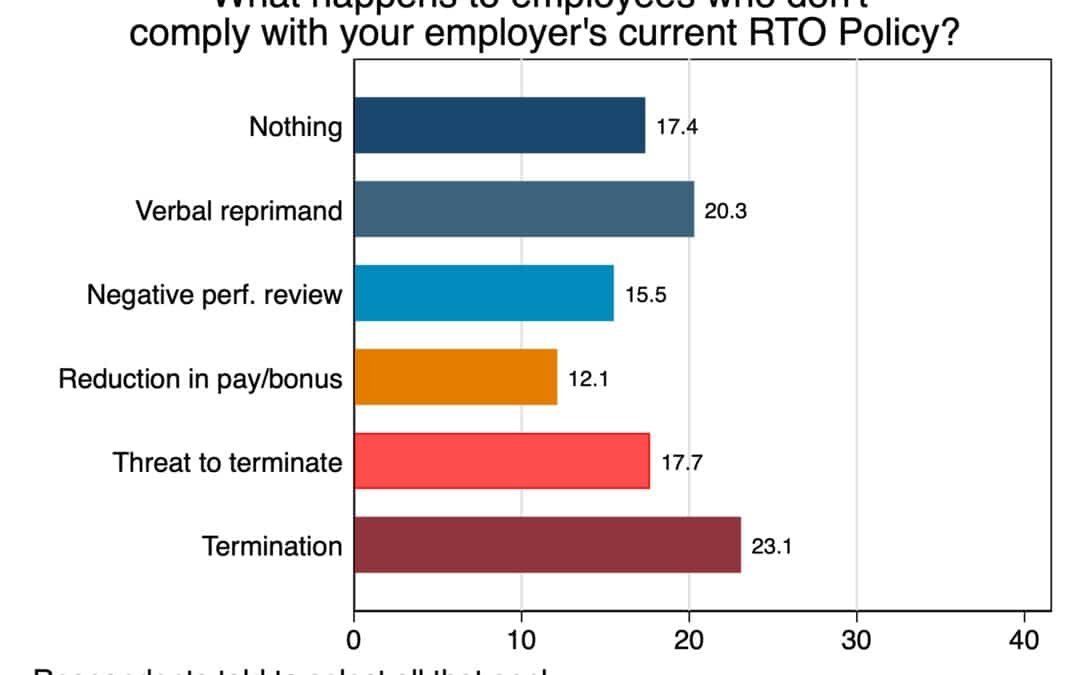The Future of Work Continues to Look More Virtual
More bosses are backing up their return-to-office mandates by terminating employees who refuse to comply.
Employees are responding by telling control freak bosses to shove those lengthy commutes.
Dell offers a recent example. The computer company recently asked workers to classify themselves as remote and keep their jobs. One catch: Remote workers would forfeit any chance at promotions.
According to Business Insider, nearly 50% of Dell’s workforce happily accepted career sabotage vs. commuting. What’s more, I’d bet many who chose to stay home are high performers.
They have leverage. Instead of wasting time commuting, they probably are looking for remote work. That has grave implications for future productivity.
Inflexibility Creates Exodus of Top Talent
During layoffs, most bosses fire low performers first. Those weak employees have no leverage.
But your top performers will use their leverage, and their careers won’t stay stuck for long.
This has grave ramifications for productivity. Great employees may come to the office a few days a week to fulfill mandates. But as soon as they snag another opportunity, they’re gone, securing their future, not yours.
Besides, some may be near retirement. Your shove back into the office could shove them out the door. Maybe they’re tired of the rat race. Maybe they have a hefty 401K, lots of equity in their property and few debts.
I’ve heard stories of people who, instead of returning to the lengthy commute, retired. Some augment their investment income with a little bit of Ubering, Instacart shopping or DoorDashing.
Either way, they’re happier with the option to move to a place with a lower cost of living. They buy a larger house on more land with less money. They leave stress behind.
That leaves you, the boss who just could not wait to get your employees back under your thumb, with fewer high-performing teams. Your best workers follow the 20% you fired out the door. Maybe you only lost 25%-30% of your employees. But you lost 60%-80% of your productivity.
All because you’re a control freak.
More and more professional profiles are like my coworkers. They may live in Atlanta, Nashville or Wake Forest. But they work for Tompkins Ventures in Raleigh, N.C.
In the old, pre-pandemic times, people might look at that and think, “Wow, what a long commute.”
But those commutes might be going upstairs or walking 12 steps. Not long at all.
They are happy. I think it’s marvelous. And I don’t have to pay for an office.
Breaking Down Your Misguided Crackdown
Research from the Survey of Working Arrangements and Attitudes (SWAA) shows that bosses are firing truant remote workers twice as often as two years ago.
In 2022, 12% of employers terminated such recalcitrant workers. Now, that number has ticked up to 23%. And another 17.7% are threatening to fire their rebellious charges.
When faced with employees who are working at home without leave, bosses:
- Do nothing: 17.4%
- Give verbal reprimands: 20.3%
- Issue negative performance reviews: 15.5%
- Reduce pay or bonuses: 12.1%
- Threaten to terminate: 17.7%
- Terminate: 23.1%
That heavy emphasis on termination ignores everything we’ve learned over the last few years. Flexibility can help with diversity. Innovations can expand this flexibility to your blue-collar workforce. Family-friendly policies lure workers who otherwise might not give you a look.
Adapt – Or Lose Your Best Talent
Face it, most people love their family more than they love their job. If it’s their child, spouse or boss, you lose.
And that’s as it should be.
So once again, our corporate “leaders” are headed down the wrong path.
So, trot out your shiny new return-to-office policy. See people ignore it. Fire a few – the lowest-quality employees, of course. Then act surprised when your best employees look elsewhere.
Across the board, bosses should compare the people you plan to fire with the people you expect to stay. Then, you should factor in the possibility that the ones you want will not want you.
You are failing to consider the potential for increased productivity and employee satisfaction that remote work offers. You are failing to adapt to the reinvention of work.
Today’s changed work culture values location flexibility. Hardcore control freaks risk losing their best talent to competitors who embrace remote work.
In your quest for returning to the office, you are sacrificing innovation and, ultimately, your company’s success.
Related Reading
- Flexibility Can Key Diversity, Employee Retention
- Redefining Work in 2024: Return-to-Office Mandates Cost
- Family-Friendly, Flexibility Redefine the Future of Work
- Future of Work Might Require Rethinking Office Location
Jim Tompkins, Chairman and founder of Tompkins Ventures and Tompkins Solutions, is an international authority on designing and implementing end-to-end supply chains. Over five decades, he has designed countless industrial facilities and supply chain solutions, enhancing the growth of numerous companies. Jim earned his B.S., M.S. and Ph.D. in Industrial Engineering from Purdue University.


I simply could not go away your web site prior to suggesting that I really enjoyed the standard info a person supply on your guests Is going to be back incessantly to investigate crosscheck new posts